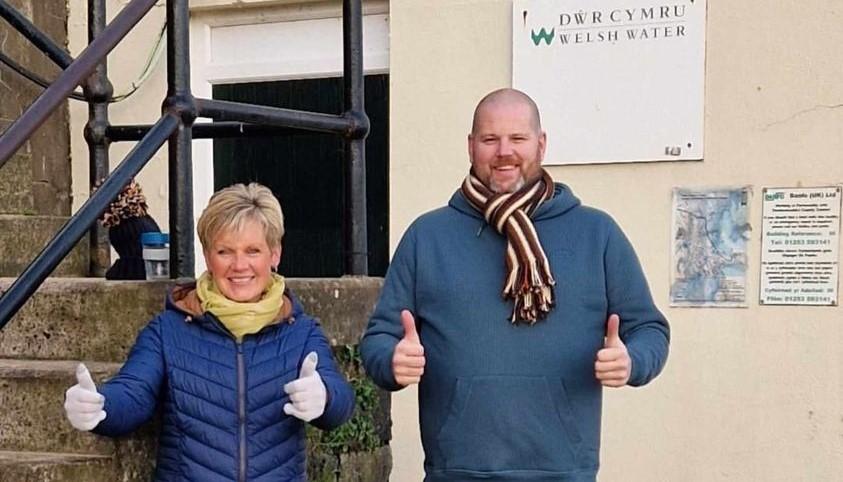News
Poo would have thought it: 60 of 68 toilets in Pembrokeshire survive the axe

SIXTY of Pembrokeshire’s 68 public toilets will be kept open despite fears many more of them were under threat of potential closure, senior councillors heard yesterday, December 4.
Due to financial constraints, the February meeting of Pembrokeshire County Council’s Cabinet listed 34 of its 68 toilets at potential risk of closure if community asset transfers to town and community councils or other sources of funding weren’t agreed.
Since then, there has been good news for some of the closure-threatened toilets, with Pembrokeshire Coast National Park Authority agreeing to fund 10 coastal facilities for two years, and the county council funding Dale facilities from its car parking budget.
At Pembrokeshire County Council’s Cabinet meeting of December 4, members – along with receiving an update on the situation – considered eight exception requests for toilets at risk of closure from town and community councils who feel they have been disproportionately financially affected.
Cabinet members backed a recommendation to continue to fund Tenby North Beach, with investigation of income-generating opportunities such as charging to use or linking to other sources of funding.
It is also backed Abereiddy’s toilets remaining open until March 31, 2025 while funding avenues are fully explored.
Cwm yr Eglwys has been given a June 30, 2024 date, with the facility at Pwllgwaelod to continue.
An April 8 closure date was backed for several other facilities if funding can’t be found: Carew, Moylegrove, Newgale South, and Nolton Haven (the latter both currently closed for the winter).
Conversations are ongoing for town and community councils to either fund, lease or asset transfer seven facilities, including Newport Parrog.
Facilities at Abercastle, Amroth East, Bryn Road St Davids, Creswell Quay, Kilgetty, and Neyland Marina will stay open until April 8, after which time they will be closed unless funding has been agreed.
An exception was made in the case of Newport Parrog, with an extension to September 30, due to complexities at this site.
A 50 per cent funding offer for Bosherston toilets for two seasons by the National Trust was refused, with an April 8 closure date on the cards.
Cabinet Member for Residents’ Services Cllr Rhys Sinnett said positive progress had been made “in seeking to sustain a network across the county,” with “complex and delicate negotiations with stakeholders”.
Cllr Jon Harvey said he was proud of the work that had gone on, adding: “To get to a situation where we have saved so many through cooperation is extremely positive; 60 of 68 are effectively remaining open, an excellent, excellent result.”
He asked if further negotiations with the “rather wealthy charity” the National Trust could take place over Bosherston, with the possibility of the trust funding the toilets 100 per cent, with Cllr Sinnett agreeing to further discussions.
Cllr Neil Prior said the potential toilet closures were “a difficult decision driven by the funding crisis we’ve been facing,” adding: “Officers and members have worked incredibly hard to get us to this point, nobody wanted to close any toilets.”
Council leader Cllr David Simpson said: “It’s wonderful we’re saving 60 out of 68 toilets, a very reasonable and sensible solution in the end; we might be able wangle a few more to stay open.”
Legal avenues are being explored for two facilities with a view to close Burton and Oriel Y Parc St David’s, with facilities at Marloes village now closed as no alternative funder has come forward.
The decision on the Tenby toilets was welcomed by Mayor Cllr Dai Morgan and local county councillor Sam Skyrme-Blackhall after the meeting.
Tenby Town Council have agreed to fund costs of keeping the toilets open in Upper Frog St, which means that there will be no toilet closures in the town.
Cllr Morgan said: “This is good news for the town, and I am grateful that Pembrokeshire County Council Cabinet listened to our strong case.”
Cllr Skyrme-Blackhall praised the decision and thanked the cabinet for their support, adding “Sometimes things take time to sort out, but we have been working hard behind the scenes and I am delighted at the outcome.”
In the north of the county, Cllr Huw Murphy welcomed the news the Pwllgwaelod public toilets will remain open.
“Cwm yr Eglwys toilets (seasonal opening) remains a work in progress but will remain open until at least June 30 while efforts to secure funding to retain permanently are ongoing.”
Pictured: Mayor of Tenby Cllr Dai Morgan and County Councillor Sam Skyrme-Blackhall celebrate on hearing the news Tenby’s North Beach toilets will remain open. Picture: Cllr Skyrme-Blackhall (Image: Tenby Town Council)
Community
Milford Haven Town Council seeks nominations for 2025 Citizens’ Awards

MILFORD HAVEN TOWN COUNCIL is inviting residents to put forward their local heroes for recognition in this year’s Citizens’ Awards.
The annual awards celebrate the efforts of individuals and groups who go above and beyond to make Milford Haven a better place—voluntarily and without any form of payment.
Nominations are now open, and members of the public are encouraged to take a moment to think about those who deserve a special thank you. Whether it’s someone who supports vulnerable neighbours, leads a youth group, organises community events, or simply goes out of their way to help others, the Town Council wants to hear about them.
A spokesperson for the council said: “These awards are a fantastic way to recognise the unsung heroes of our town—the people whose efforts too often go unnoticed. If you know someone who gives their time freely to benefit the local community, we urge you to nominate them.”
Nominations must be submitted by 12:00pm on Tuesday, April 22, 2025.
To obtain a nomination form:
- Email: admin@milfordhaven-tc.gov.wales
- Contact the Town Council via its Facebook page
- Telephone: 01646 692505 to request a postal form
Please note: Awards can only be granted to those working in a voluntary capacity, and previous award recipients are not eligible for nomination.
For inspiration, you can view highlights from last year’s ceremony via Milford Haven Town Council’s Facebook page:
facebook.com/milfordhaventowncouncil/posts/pfbid02f7WhKXhjtDxEqV68ujznDvFX89yhBYe8dQgXtqqY19Yb7bC7SeNYW6Ua42E4Ehevl
The council encourages everyone to get involved and help shine a light on the incredible community spirit that defines Milford Haven.
Entertainment
The authentic sound of The Rolling Stones… with the world’s premier Jagger lookalike

CAPTURING the authentic sound and spirit of The Greatest Rock n’ Roll Band In The World, NOT THE ROLLING STONES have played festivals, theatres and private gigs throughout Europe, the middle east and the UK. This May, they will appear here on the Torch Stage in Pembrokeshire!
Featuring the best Mick Jagger lookalike you will ever see, truly international tribute act in demand all over Europe as well as the UK, will take you back to the Golden Age of The Stones- from Satisfaction to Sympathy for the Devil… You won’t believe it’s not Jagger!
Based on the Rolling Stones, an English rock band formed in London in 1962 and active for over six decades, they were one of the most popular, influential, and enduring bands of the rock era and pioneered the gritty, rhythmically driven sound that came to define hard rock, and Not The Rolling Stones carry on that legacy today.
They have the unique asset of a ‘Mick and Keith’ who stagger audiences with their authenticity, also attested by the many TV and film credits they have between them.
Backed by a superb group of professional musicians that love the music they are playing; they convey their enthusiasm for the work of the world’s greatest rock and roll band.
Not the Rolling Stones will be on the Torch Theatre stage on Friday 16 May at 7.30pm. Tickets are £25. Visit the website for further details www.torchtheatre.co.uk or phone the Box Office on (01646) 695267.
Business
Wales leads Britain in export growth for financial and professional services

Financial exports soar by 63.5% to £4.3bn
WALES has outpaced every other part of Great Britain in export growth for financial and related professional services, according to a new report by TheCityUK.
The report, Exporting from across Britain: Financial and related professional services 2025, reveals that exports from Wales surged by 63.5% in 2022, reaching £4.3bn—significantly ahead of the national average.
Across Great Britain, total financial and related professional services exports rose by 18.4% to £158bn, with nearly half (47%) generated outside London. Wales contributed 2.9% of the UK’s total financial services exports and 2% of the related professional services total.
The report provides a breakdown of 2022 data by region and nation, highlighting the growing contribution of areas outside London in strengthening the UK’s role as a global financial centre.
In terms of export destinations, 27% of Wales’s financial services exports went to the European Union, with the remaining 73% reaching markets across the rest of the world.
Tom Bray, TheCityUK Chair for Wales and Senior Office Partner (Cardiff) at Eversheds Sutherland, said: “It’s great to see such strong growth in Wales for financial and related professional services exports. Our skill and ability to provide high-quality financial and professional services plays an important role in driving growth in Wales, creating jobs and opportunities for communities across the nation.”
Anjalika Bardalai, Chief Economist and Head of Research at TheCityUK, added: “In 2022, Wales had an extremely strong year of export growth, albeit from a lower base than most regions. Nearly half of all UK exports in financial and related services now come from outside London, reinforcing the UK’s strength as an international financial hub and the importance of regional contributions.”
Policy recommendations
TheCityUK report also outlines a series of recommendations for industry, government, and regulators to support export growth in Wales and beyond. These fall under three key areas:
1. Improving access to trade opportunities
- Better coordination between UK government, devolved administrations, and investment bodies.
- Align local growth strategies with national trade goals.
- Launch a pilot national brokerage scheme to connect capital with investable projects.
2. Expanding global market access
- Finalise FTAs with Switzerland and India, ensuring better market access and digital trade provisions.
- Use talks with the Gulf Cooperation Council to promote regulatory cooperation.
- Strengthen regulatory dialogues with major markets like the US, EU, Japan, and Singapore.
- Replicate successful models like the UK-Switzerland MRA with other global financial centres.
- Encourage domestic and international investment into UK scale-up businesses.
3. Positioning the UK for future demand
- Make the UK a global hub for data, tech, and innovation.
- Establish the UK as the gateway for international investment.
- Focus development work on high-potential markets to maximise value.
The report underlines that Wales’s performance demonstrates the growing importance of the UK’s nations and regions in maintaining the country’s competitive edge on the global stage.
-

 Charity6 days ago
Charity6 days agoEmergency services unite for charity at Pembroke Dock Fire Station
-

 Sport6 days ago
Sport6 days agoKildunne hat-trick rips Wales apart in record-breaking Six Nations clash
-

 Community7 days ago
Community7 days agoTenby comes alive with eccentricity as Steampunk Festival returns in style
-

 Education6 days ago
Education6 days agoSupported employment learners take off on airport adventure
-

 Community6 days ago
Community6 days agoFuneral arrangements confirmed for popular local entertainer, Matt Baker
-

 Business4 days ago
Business4 days agoSpaceX eyes Milford Haven for new UK facility
-

 Crime5 days ago
Crime5 days agoPembrokeshire farm worker accused of threatening to burn employer’s farm
-

 Crime4 days ago
Crime4 days ago‘Yeah but no but’ insult to female officer lands Monkton man with court fine
































